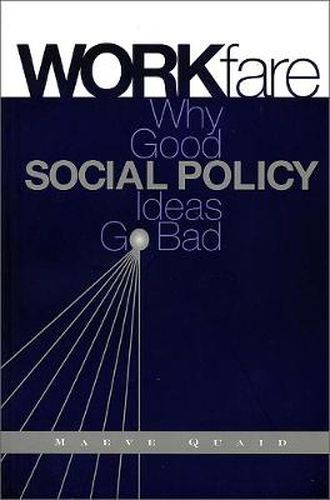Workfare: Why Good Social Policy Ideas Go Bad
Maeve Quaid

Workfare: Why Good Social Policy Ideas Go Bad
Maeve Quaid
One of the greatest, as well as the most debated, social policy ideas of the 1980s and 1990s was workfare. In Workfare: Why Good Social Policy Ideas Go Bad, Maeve Quaid delves into the definition and history of workfare, and then continues with a critical and comparative analysis of workfare programs in six jurisdictions: three American (California, Wisconsin, New York) and three Canadian (Alberta, Ontario, New Brunswick). Drawing from these case studies, Quaid develops an analytic model that illustrates how workfare falls prey to a series of hazards whereby good social policy ideas fail. Their demise, argues Quaid, begins with politicians with a zest for big ideas but little interest in implementation, continues with short-sighted policy makers, resistant bureaucrats, cynical recipients, flawed evaluations, and is completed by fleeting and fickle public attention for these news stories. Quaid’s identification and analysis of these hazards is especially valuable because the hazards can also be applied to innovation in any area of social policy, such as health-care, education, pension plans, child-care, and unemployment insurance.
This item is not currently in-stock. It can be ordered online and is expected to ship in approx 3 weeks
Our stock data is updated periodically, and availability may change throughout the day for in-demand items. Please call the relevant shop for the most current stock information. Prices are subject to change without notice.
Sign in or become a Readings Member to add this title to a wishlist.


